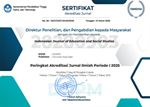Adeoye-Olatunde, O. A., & Olenik, N. L. (2021). Research and Scholarly Methods: Semi-Structured Interviews. Journal of The American College of Clinical Pharmacy, 4(10), 1358-1367. https://doi.org/10.1002/jac5.1441
Alam, G. M., Forhad, A. R., & Ismail, I. A. (2020). Can Education as an ‘International Commodity’ Be the Backbone or Cane of a Nation in the Era of Fourth Industrial Revolution?-A Comparative Study. Technological Forecasting and Social Change, 159, 120184. https://doi.org/10.1016/j.techfore.2020.120184
Barbera, S. A., Berkshire, S. D., Boronat, C. B., & Kennedy, M. H. (2020). Review of Undergraduate Student Retention and Graduation Since 2010: Patterns, Predictions, and Recommendations for 2020. Journal of College Student Retention: Research, Theory & Practice, 22(2), 227-250. https://doi.org/10.1177/1521025117738233
Barksdale, C., Peters, M. L., & Corrales, A. (2021). Middle School Students' Perceptions of Classroom Climate and Its Relationship to Achievement. Educational Studies, 47(1), 84-107. https://doi.org/10.1080/03055698.2019.1664411
Berger, J. L., & Girardet, C. (2021). Vocational Teachers’ Classroom Management Style: The Role of Motivation to Teach and Sense of Responsibility. European Journal of Teacher Education, 44(2), 200-216. https://doi.org/10.1080/02619768.2020.1764930
Cayubit, R. F. O. (2022). Why Learning Environment Matters? An Analysis on How the Learning Environment Influences the Academic Motivation, Learning Strategies and Engagement of College Students. Learning Environments Research, 25(2), 581-599. https://doi.org/10.1007/s10984-021-09382-x
Cents, M. B., Lichtwarck-Aschoff, A., Denessen, E., Aelterman, N., & Haerens, L. (2021). Fostering Student Engagement with Motivating Teaching: An Observation Study of Teacher and Student Behaviours. Research Papers in Education, 36(6), 754-779. https://doi.org/10.1080/02671522.2020.1767184
Egeberg, H., McConney, A., & Price, A. (2021). Teachers' Views on Effective Classroom Management: A Mixed-Methods Investigation in Western Australian High Schools. Educational Research for Policy and Practice, 20(2), 107-124. https://doi.org/10.1007/s10671-020-09270-w
Essel, H. B., Vlachopoulos, D., Nunoo, F. K. N., & Johnson, E. E. (2022). Nomophobia Among Preservice Teachers: A Descriptive Correlational Study at Ghanaian Colleges of Education. Education and Information Technologies, 27(7), 9541-9561. https://doi.org/10.1007/s10639-022-11023-6
Friedman, J., York, H., & Gakidou, E. (2020). Measuring and Forecasting Progress Towards the Education-Related SDG Targets. Nature, 580(7805), 636-639. https://doi.org/10.1038/s41586-020-2198-8
Goczek, Ł., Witkowska, E., & Witkowski, B. (2021). How Does Education Quality Affect Economic Growth?. Sustainability, 13(11), 6437. https://doi.org/10.3390/su13116437
Guzik, P., & Więckowska, B. (2023). Data Distribution Analysis–A Preliminary Approach to Quantitative Data in Biomedical Research. Journal of Medical Science, 92(2), e869-e869. https://doi.org/10.20883/medical.e869
Herman, K. C., Reinke, W. M., Dong, N., & Bradshaw, C. P. (2022). Can Effective Classroom Behavior Management Increase Student Achievement in Middle School? Findings From a Group Randomized Trial. Journal of Educational Psychology, 114(1), 144. https://doi.org/10.1037/edu0000641
Hursen, C. (2021). The Effect of Problem-Based Learning Method Supported by Web 2.0 Tools on Academic Achievement and Critical Thinking Skills in Teacher Education. Technology, Knowledge and Learning, 26(3), 515-533. https://doi.org/10.1007/s10758-020-09458-2
Longobardi, C., Settanni, M., Lin, S., & Fabris, M. A. (2021). Student-Teacher Relationship Quality and Prosocial Behaviour: The Mediating Role of Academic Achievement and a Positive Attitude Towards School. British Journal of Educational Psychology, 91(2), 547-562. https://doi.org/10.1111/bjep.12378
Mohamed, B. H., Ari, I., Al-Sada, M. B. S., & Koç, M. (2021). Strategizing Human Development for a Country in Transition from a Resource-Based to a Knowledge-Based Economy. Sustainability, 13(24), 13750. https://doi.org/10.3390/su132413750
Ong, S. G. T., & Quek, G. C. L. (2023). Enhancing Teacher-Student Interactions and Student Online Engagement in an Online Learning Environment. Learning Environments Research, 26(3), 681-707. https://doi.org/10.1007/s10984-022-09447-5
Pinquart, M., & Ebeling, M. (2020). Parental Educational Expectations and Academic Achievement in Children and Adolescents—A Meta-Analysis. Educational Psychology Review, 32(2), 463-480. https://doi.org/10.1007/s10648-019-09506-z
Piwowar-Sulej, K. (2021). Human Resources Development as an Element of Sustainable HRM–With the Focus on Production Engineers. Journal of Cleaner Production, 278, 124008. https://doi.org/10.1016/j.jclepro.2020.124008
Rusticus, S. A., Pashootan, T., & Mah, A. (2023). What Are the Key Elements of a Positive Learning Environment? Perspectives from Students and Faculty. Learning Environments Research, 26(1), 161-175. https://doi.org/10.1007/s10984-022-09410-4
Sakineh, J., & Ali, A. (2020). Predicting Students' Academic Achievement Based on the Classroom Climate, Mediating Role of Teacher-Student Interaction and Academic Motivation. Интеграция образования, 24(1 (98)), 62-74. https://doi.org/10.15507/1991-9468.098.024.202001.062-074
Saravanakumar, A. R. (2020). Life Skill Education for Creative and Productive Citizens. Journal of Critical Reviews, 7(9), 554-558. https://doi.org/10.31838/jcr.07.09.110
Savolainen, H., Malinen, O. P., & Schwab, S. (2022). Teacher Efficacy Predicts Teachers' Attitudes Towards Inclusion: A Longitudinal Cross-Lagged Analysis. International Journal of Inclusive Education, 26(9), 958-972. https://doi.org/10.1080/13603116.2020.1752826
Shittu, A. A., Olubor, R. O., & Oladimeji, R. M. (2021). Demand for and Supply of Teachers in Public Junior Secondary Schools in Kwara State. Benin Journal of Educational Studies, 27(1), 70-82.
Siedlecki, S. L. (2020). Understanding Descriptive Research Designs and Methods. Clinical Nurse Specialist, 34(1), 8-12. https://doi.org/10.1097/NUR.0000000000000493
Stofkova, Z., & Sukalova, V. (2020). Sustainable Development of Human Resources in Globalization Period. Sustainability, 12(18), 7681. https://doi.org/10.3390/su12187681
Tao, Y., Meng, Y., Gao, Z., & Yang, X. (2022). Perceived Teacher Support, Student Engagement, and Academic Achievement: A Meta-Analysis. Educational Psychology, 42(4), 401-420. https://doi.org/10.1080/01443410.2022.2033168
Toropova, A., Myrberg, E., & Johansson, S. (2021). Teacher Job Satisfaction: The Importance of School Working Conditions and Teacher Characteristics. Educational Review, 73(1), 71-97. https://doi.org/10.1080/00131911.2019.1705247
Toutkoushian, R. K., May-Trifiletti, J. A., & Clayton, A. B. (2021). From “First in Family” to “First to Finish”: Does College Graduation Vary by How First-Generation College Status Is Defined?. Educational Policy, 35(3), 481-521. https://doi.org/10.1177/0895904818823753
Wang, T., Lund, B. D., Marengo, A., Pagano, A., Mannuru, N. R., Teel, Z. A., & Pange, J. (2023). Exploring the Potential Impact of Artificial Intelligence (AI) on International Students in Higher Education: Generative AI, Chatbots, Analytics, and International Student Success. Applied Sciences, 13(11), 6716. https://doi.org/10.3390/app13116716
Wiltshire, G., & Ronkainen, N. (2021). A Realist Approach to Thematic Analysis: Making Sense of Qualitative Data Through Experiential, Inferential and Dispositional Themes. Journal of Critical Realism, 20(2), 159-180. https://doi.org/10.1080/14767430.2021.1894909
Yang, D., & Tu, C. C. (2021). Influence of College Students' Agreeableness on Interpersonal Relationships: Moderating Role of Empathy. Education and Urban Society, 53(4), 383-401. https://doi.org/10.1177/0013124520928609
Сагикызы, А., Шуршитбай, М., & Ахмедова, З. (2021). Upbringing and Education as Factors of Human Capital Development. Адам әлемі, 88(2), 18-25. https://doi.org/10.48010/2021.2/1999-5849.03
 (South Amazon University)
(South Amazon University) 



